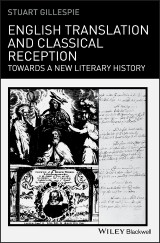Details

English Translation and Classical Reception
Towards a New Literary HistoryClassical Receptions 1. Aufl.
|
91,99 € |
|
| Verlag: | Wiley-Blackwell |
| Format: | EPUB |
| Veröffentl.: | 20.07.2021 |
| ISBN/EAN: | 9781444396492 |
| Sprache: | englisch |
| Anzahl Seiten: | 224 |
DRM-geschütztes eBook, Sie benötigen z.B. Adobe Digital Editions und eine Adobe ID zum Lesen.
Beschreibungen
<i>English Translation and Classical Reception</i> is the first genuine cross-disciplinary study bringing English literary history to bear on questions about the reception of classical literary texts, and vice versa. The text draws on the author’s exhaustive knowledge of the subject from the early Renaissance to the present. <ul> <li>The first book-length study of English translation as a topic in classical reception</li> <li>Draws on the author’s exhaustive knowledge of English literary translation from the early Renaissance to the present</li> <li>Argues for a remapping of English literary history which would take proper account of the currently neglected history of classical translation, from Chaucer to the present</li> <li>Offers a widely ranging chronological analysis of English translation from ancient literatures</li> <li>Previously little-known, unknown, and sometimes suppressed translated texts are recovered from manuscripts and explored in terms of their implications for English literary history and for the interpretation of classical literature<br /> <br /> <br /> </li> </ul> <p> </p>
<p>Preface vi</p> <p>Acknowledgements viii</p> <p>Note on Texts x</p> <p>1. Making the Classics Belong: A Historical Introduction 1</p> <p>2. Creative Translation 20</p> <p>3. English Renaissance Poets and the Translating Tradition 33</p> <p>4. Two-Way Reception: Shakespeare’s Influence on Plutarch 47</p> <p>5 Transformative Translation: Dryden’s Horatian Ode 60</p> <p>6. Statius and the Aesthetics of Eighteenth-Century Poetry 76</p> <p>7. Classical Translation and the Formation of the English Literary Canon 93</p> <p>8. Evidence for an Alternative History: Manuscript Translations of the Long Eighteenth Century 104</p> <p>9. Receiving Wordsworth, Receiving Juvenal: Wordsworth’s Suppressed Eighth Satire 123</p> <p>10. The Persistence of Translations: Lucretius in the Nineteenth Century 150</p> <p>11. ‘Oddity and struggling dumbness’: Ted Hughes’s Homer 163</p> <p>12. Afterword 180</p> <p>References 183</p> <p>Index of Ancient Authors and Passages 200</p> <p>General Index 203</p>
<p>“Stuart Gillespie’s English Translation and Classical Reception is a beneficiary of this ferment, supplemented by the author’s comprehensive knowledge of translation history, translation theory, and the growing bibliography in his field.” (<i>Modern Philology</i>, 1 August 2014)</p> <p>"Overall, this volume will be a key resource for the study of creative translation of classical texts in English, and thoroughly succeeds in emphasising its importance in the history of English literature. Its author's unmatched grasp of the range of the source material is a great benefit...." (Bmcreview, 8 February 2012)</p> <p>“Taken together, the various case studies of the book express an energetic engagement with the rich inheritance of classical literature and its complex role in and through English translation.” (<i>CJ-Online</i>, 5 September 2012)</p> <p> </p> <p> </p> <p> </p>
<p><b>THE AUTHOR</b> <p><b>STUART GILLESPIE</b> is Reader in English Literature at the University of Glasgow, Scotland. His recent publications include <i>Shakespeare's Books: A Dictionary of Shakespeare Sources</i> (2001), <i>Shakespeare and Elizabethan Popular Culture,</i> edited with Neil Rhodes (2006), and <i>The Cambridge Companion to Lucretius,</i> edited with Philip Hardie (2007). He edits the journal <i>Translation and Literature</i> and is co-editor of the <i>Oxford History of Literary Translation in English</i>.
<p><b>CLASSICAL RECEPTION</b> <p><b>ENGLISH TRANSLATION AND CLASSICAL RECEPTION<br> TOWARDS A NEW LITERARY HISTORY</b> <p>This first book-length study of English translation as a topic in classical reception engages with the dialogues generated between individual translations and their source-texts, but also with the wide and deep tradition to which they belong. Mixing survey chapters with case studies, <i>English Translation and Classical Reception</i> threads its way from Shakespeare to the late twentieth century. <p>As lead editor of the first history of English literary translation, Gillespie has been a major force in recovering the remarkable and extensive history of translators' engagements with the classics over the centuries. This book focuses on the implications both for English literary history and for classical scholarship. But Gillespie then goes on to dig down to a new level of historical rediscovery in his analysis of a range of forgotten, unpublished, and suppressed classical translations by writers across the centuries. This important text will mark a change in the way in which the English reception of classical literature is viewed and studied.
“This bold book is a welcome challenge to sacred tenets of English literary history. Gillespie brilliantly and rigorously forces us to face the inconvenient truth of the role of classical translation in English literature.” <br /> <i>Susanna Braund, University of British Columbia<br /> </i><br /> “We have long needed this meta-history explaining the canon of literary translations and its strategic omissions. Gillespie’s magisterial survey gives the pleasure of a conspective view clearly expressed.” <br /> <i>Alastair Fowler, University of Edinburgh<br /> </i><br /> “An inspiring and astringent polemic on behalf of translation, the creative carriage into English of Homer, Virgil, Lucretius and others, and its vitalizing effect on literary tradition.”<br /> <i>Adrian Poole, University of Cambridge<br /> <br /> </i>“These carefully crafted studies by a leading expert in translation studies collectively make an overwhelming case for the centrality of literary translation in the history both of English literature and of the reception of classical antiquity.”<br /> <i>Philip Hardie, Trinity College, Cambridge<br /> </i><br /> “A brilliant guide to the major issues that drive translation studies, equally illuminating on both lost or neglected works and on some of the most familiar masterpieces, ancient and modern.”<br /> <i>Joseph Farrell, University of Pennsylvania<br /> </i><br /> <br />

















